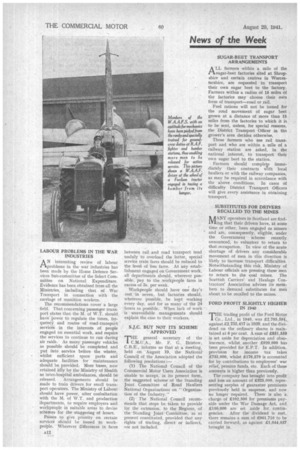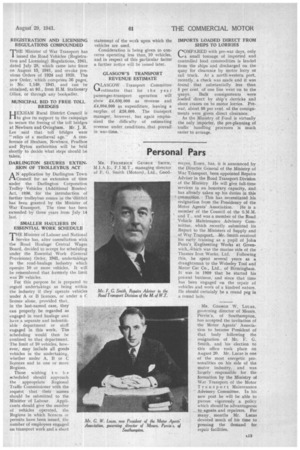News of the Week
Page 14

Page 15

If you've noticed an error in this article please click here to report it so we can fix it.
LABOUR PROBLEMS IN THE WAR INDUSTRIES
AN interesting review of labour problems in the war industries has been made by the Home Defence Services Sub-committee of the Select Committee on National Expenditure. Evidence has been obtained from all the Ministries, including that of War Transport in connection with the carriage of munition workers.
The recommendations cover a large field. That concerning passenger transport states that the M. of W.T. should have Power to regulate the times, frequency and routes of road-transport services in the interests of people engaged on essential work, and require the services to continue to run during air raids. As many passenger vehicles as possible should be completed and put into service before the winter, whilst sufficient spare parts and adequate facilities for maintenance should be provided. More buses, now retained idly by the Ministry of Health as inter-hospital ambulances, should be released. Arrangements should be made to train drivers for small transport operators. The Ministry of Labour should have power, after consultation with the M. of W.T. and production departments, to require employers and workpeople in suitable areas to devise schemes for the staggering of hours.
Passes to give priority on certain services should be issued to workpeo'ple. Wherever differences in fares
between rail and road transport tend unduly to overload the latter, special service train fares should be reduced to the level of bus fares. At any establishment engaged on Government work, all departments should, wherever possible, pay to the workpeople fares in excess of 3s, per week.
Workpeople should have one day's rest -in seven, but factories should, wherever possible, be kept working every day, and for as many of the 24 hours as possible. When lack of work is unavoidable managements should explain the case to their workers.
S.J.C. BUT NOT ITS SCHEME APPROVED
THEgeneral secretary of the C.M.U.A., Mr. F. G. Bristow, C.B.E., informs us that at a meeting, held on August 19, the National. Council of the Association adopted the following resolutions :
(1) The National Council of the Commercial Motor Users Association is unable to accept, in its present form, the suggested scheme of the Standing Joint Committee of Road Hauliers National Organizations on " Organization of the Industry."
(2) The National Council recommends that steps be taken to provide' for the extension, to the Regions, of the Standing Joint Committee, as at present constituted, provided that any rights of trading, direct or indirect, are not included. SUGAR-BEET TRANSPORT ARRANGEMENTS
ALL farmers within a mile of the sugar-beet factories sited at Shropshire and certain centres in Worcestershire, are requested to transport their own sugar beet to the factory. Farmers within a radius of 15 miles of the factories may choose their own form of transport—road or rail.
Fuel rations will not be issued for the road movement of sugar beet grown at a distance of more than 15 miles from the factories to which it is to be sent, unless, for special reasons, the District Transport Officer in the grower's area decides otherwise.
Those farmers who use rail transport and who are within a mile of a railway station are asked, in the national interest, to transport their own sugar beet to the station.
Farmers should complete immediately their contracts with local hauliers or with the railway companies, as may be required in accordance with the above conditions. In cases of difficulty District Transport Officers will give every assistance in obtaining transport.
SUBSTITUTES FOR DRIVERS RECALLED TO THE MINES ItiTANY operators in Scotland are findMing that their drivers have, at some time or other, been engaged as miners and are, consequently, eligible, under the Government scheme recently announced, to volunteer to return to that occupation. In view of the acute shortage of drivers any considerable movement of men in this direction is likely to increase transport difficulties. Notwithstanding this risk, Ministry of Labour officials are pressing these men to return to the coal mines. The Scottish Carriers' and Haulage Contractors' Association advises its members to demand substitutes for men about to be recalled to the mines.
FORD PROFIT SLIGHTLY HIGHER IN 1940 .
'TILE trading profit of the Ford Motor 1 CO., Ltd., in 1940, was £2,785,594,. against £2,753,417 in 1939, and the dividend on the ordinary shares is maintained at 6 per cent. A sum of £851,559 is set aside for depreciation and obsolescence, whilst, another £920,000 has been provided for E.P.T. In addition, provision for income tax takes 4735,000, whilst £176,579 is accounted for by contributions to employees' war relief, pension funds, etc. Each of these amounts is higher than previously.
The company has brought into profit and loss an amount of £925,000, representing surplus of guarantee premiums previously held in suspense, and now no longer required. There is also a, charge of £102,500 for premiums payable under the War Damage Act, and £100,000 are set aside for. contingencies. After the dividend is met, there remains a sum of £961,716 to be carried forward, as against £1,044,037 brought in. REGISTRATION AND LICENSING REGULATIONS COMPOUNDED
THE Minister of War Transport has issued the Road Vehicles (Registration and Licensing) Regulations, 1941. dated July 28, which came into force on August 15, 1941, and revoke previous Orders of 1924 and 1938. The new Order, which comprises 36 pages, is No. 1,149, 1941, and can be obtained, at 9d., from H.M. Stationery Office, or through any boolsseller.
MUNICIPAL BID TO FREE TOLL BRIDGES
HEXHAM Rural District Council is to give its support to the campaign to secure the freeing of the toll bridges at Newbuna and Ovingharn. Mr. J. R. Lee said that toll bridges were " relics of a medimval age," A conference of Heitham, Newburn, Prudhoe and Ryton authorities will be held shortly to decide what 'steps should be
taken. • DARLINGTON SECURES EXTENSION OF TROLLEYBUS ACT
AN application by Darlington Town Council for an extension of time under the Darlington Corporation Trolley Vehicles (Additional Routes) Act, 1936, for the introduction of further trolleyhus routes in the 'district has been granted by the Minister of War Transport. The time has been extended by three years from July 14 last.
SMALLER HAULIERS IN ESSENTIAL WORK SCHEDULE THE Minister of Labour and National 1 Service has, after consultation With the Road Haulage Central Wages Board, decided to accept for scheduling under the Essential Work (General Provisions) Order, 1941, undertakings in the road-haulage industry which operate 10 or more vehicles. It will be remembered that formerly the limit was 29 vehicles.
For this purpose he is prepared to
• regard undertakings as being within the industry if they operate vehicles under A or B licences, or under a C licence alone, provided that, in the last-named case, they can properly be regarded as engaged in road haulage and have a separate and indentifiable department or staff engaged in this work. The scheduling would then be confined to that department. The limit of 10 vehicles, however, may include all goods vehicles in the undertaking, whether under A, B or C licences and in one or more Regions.
Those wishing t o b e scheduled should approach the appropriate Regional Traffic Commissioner with the request that their names should be submitted to the
Minister of Labour. Applicants should give the number of vehicles operated, the Regions in which licences oi permits have been issued, the number of employees engaged on transport work and a short
statement of the work upon which the vehicles are used.
Consideration is being given to concerns operating less than 10 vehicles, and in respect of this particular factor a further notice will be issued later.
GLASGOW'S TRANSPORT REVENUE ESTIMATE
GLASCOW Transport Committee estimates that for the year passenger-transport operation will show £4,039,000 as revenue and il4.,004,000 as expenditure, leaving a surplus of £26,000. The transport manager, however, has again emphasized the difficulty of estimating revenue under conditions that prevail in war-time.
IMPORTS LOADED DIRECT FROM SHIPS TO LORRIES
rOMPARED with pre-war days, only small tonnage of imported and controlled food commodities is lauded from the ships and discharged on the quay for clearance by motor lorry or rail truck. At a north-western port. recently, a check was made and it was found that substantially less than 5 per cent, of one line went OD to the quays. Bulk consignments were loaded direct by ship's derricks and shore cranes on to motor lorries. Prewar, about 50 per cent, of the consignments were given direct clearance.
As the Ministry of Food is virtually the only importer, the pre-planning of traffic handling processes is much easier to arrange.












































